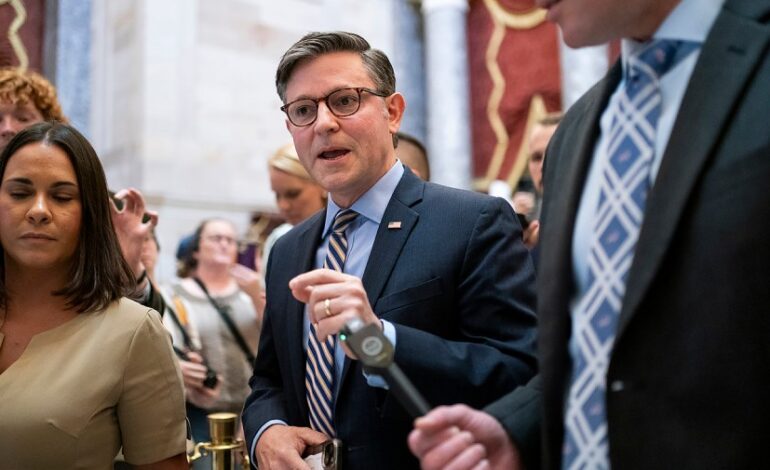House Votes on Funding Bill to Avert Government Shutdown

The House of Representatives is set to vote on a stopgap funding bill on September 29, aimed at keeping the government operational through November 21. The proposed measure, known as a continuing resolution (CR), comes as Republican leaders seek to navigate the ongoing budgetary standoff without Democratic input, reminiscent of their strategy from March.
Republican leaders are aiming to replicate their earlier success by challenging Senate Minority Leader Chuck Schumer (D-N.Y.) to force a government shutdown, betting that he will concede as he did previously. In a strategic move, House GOP leaders informed their members that they may not reconvene until after October 1, potentially sidelining previously scheduled votes on September 29 and 30 to pressure Senate Democrats into accepting their funding package.
Before the vote, House Speaker Mike Johnson (R-La.) expressed confidence that the package would pass smoothly through the House, stating, “We’re going to get this government funded.” His sentiments were echoed by House Majority Whip Tom Emmer (R-Minn.), who emphasized the understanding among Republican members regarding the necessity of the bill.
Despite this confidence, internal dissent looms, as at least four Republican lawmakers have indicated they may withhold support. The dynamics within the party create a challenging arithmetic problem for Johnson’s leadership, as they hope to send the bill to the Senate before the upcoming holiday recess.
If all members are present and voting, Republicans can afford to lose only two votes to pass the bill, given that all Democratic representatives are expected to oppose it. Among the dissenters, Libertarian-leaning Rep. Thomas Massie (R-Ky.) has consistently voted against stopgap funding measures. Additionally, Rep. Marjorie Taylor Greene (R-Ga.) has labeled support for the bill as “disloyalty” to former President Trump, while Rep. Victoria Spartz (R-Ind.) has not yet confirmed her stance, despite her history of switching votes at the last moment.
The situation is further complicated by the collective opposition from House Democrats, who have rallied against the CR. They argue that the bill undermines public health care initiatives and demand a bipartisan solution that extends subsidies for the Affordable Care Act, which are set to expire at the end of the year, and reverses recent Medicaid cuts enacted by Republicans.
Emmer dismissed the concerns raised by Democratic leaders, labeling their response as “saber-rattling.” He contended that the CR is one of the cleanest versions available, aiming to maintain essential government functions. However, the potential for Republican defections creates uncertainty as the party seeks to secure enough votes for passage.
The funding bill also serves as a loyalty test for Democrats. Rep. Jared Golden (D-Maine), who crossed party lines to support the Republican bill in March, has not publicly confirmed his voting intentions ahead of the upcoming vote. Rep. Marie Gluesenkamp Perez (D-Wash.) remains similarly undecided.
Despite strong opposition from House Democrats, they lack the power to prevent the bill’s passage, as only a simple majority is needed. The real leverage for the party lies in the Senate, where Democrats can invoke the filibuster to block legislation that fails to garner 60 votes.
In a notable shift from previous negotiations, Schumer and House Minority Leader Hakeem Jeffries (D-N.Y.) have committed to opposing the current spending package. Schumer cited the urgency of extending ACA subsidies as a key reason for this stance, asserting that Democrats find themselves in a stronger political position than they did in March.
The CR also includes critical funding provisions, such as an additional $30 million for member security following recent violent incidents and a resolution for the District of Columbia’s budget, which faced a $1 billion shortfall due to omitted funding language in the March CR.
As the House prepares for the critical vote, the outcome will play a significant role in shaping the next steps for budget negotiations and government funding, with implications for both parties as they navigate the complexities of legislative priorities and party unity.






